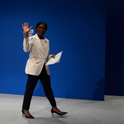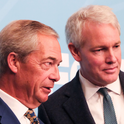Michel Barnier’s surprising reincarnation as prime minister of France may turn out to be highly consequential in normalising the French far right. Paradoxically, however, that may make it harder for Marine Le Pen and her National Rally to win the next presidential election, which is due no later than 2027.
The French political scene is more polarised and fragmented than at any time since the turbulent 1950s, before General de Gaulle created France’s strong executive presidency which sidelined the extremist parties of his day. Emmanuel Macron, the incumbent president, also had Gaullist pretensions to dominate from the centre. But after seven years in power, in the face of economic stagnation and fast-growing support for parties of the far right and far left, Macron lost his presidential majority in the snap legislative elections he called this summer.
Under the current system, an unpopular president has been forced to share power with a prime minister from a mainstream opposition party three times before. But never before with an extremist party in the driving seat.
This time, the result was three roughly equally-sized party blocs led by the far-right Le Pen, the far-left Jean-Luc Mélenchon and Macron’s own centrist/liberal Renaissance party. After weeks of stasis and his refusal to give Renaissance support to a government led by the far-left bloc, he has turned to the veteran centre-right politician Barnier to lead a government. This banks on Le Pen not immediately uniting with Mélenchon to vote it out of office.
He hopes to achieve this because Barnier, while a conventional moderate on the economic and internationalist spectrum, has moved to a hard-right position on one key issue—namely immigration. In his own unsuccessful bid for the presidency against Macron two years ago, Barnier surprisingly came out for a five-year moratorium on immigration to France, plus a tough approach to asylum seekers seeking entry outside the normal immigration system.
Barnier’s intense experience as the EU’s Brexit negotiator gave him full exposure to Nigel Farage’s successful mastery of anti-immigrant sentiment, which overwhelmed not just Britain’s centre-right Conservatives but also, for eight years, its entire political system. The lesson he drew for his native France was to seize this agenda, promising to reduce immigration dramatically without the need to vote for Le Pen or turn against conventional centrist policies of social integration at home and pro-EU, pro-Nato internationalist policies abroad.
In the last presidential election, in 2022, Macron’s centrist party was strong enough to see off Le Pen without having to manoeuvre in this way. But amid bitter controversy over Macron’s modest pension reforms, intended to “modernise” the French welfare state—as well as a growing anti-immigrant narrative—the Barnier approach was the most viable course left for Macron.
Le Pen obviously hopes that Barnier will legitimise her anti-immigrant rhetoric and pave the way for her to win in 2027 on a broader populist agenda. Maybe that will happen. But Barnier is inspired by the successful Scandinavian strategies of centrist parties reducing non-EU immigration and toughening up requirements on immigrants, while retaining a socially liberal state within an integrationist EU. Germany’s centre-left SPD and centre-right CDU are heading in the same direction, in the face of rising populist parties of both the far right and far left.
If the Barnier formula works, he might himself become its standard bearer in 2027. He would be 76 by then, almost twice as old as Macron was at his first election. But if youthful dynamism is outshone by the wily fox, so be it. De Gaulle was 79 when he stood down and Adenauer of Germany a mighty 87. Why this cult of youth if the young can’t hack it?













